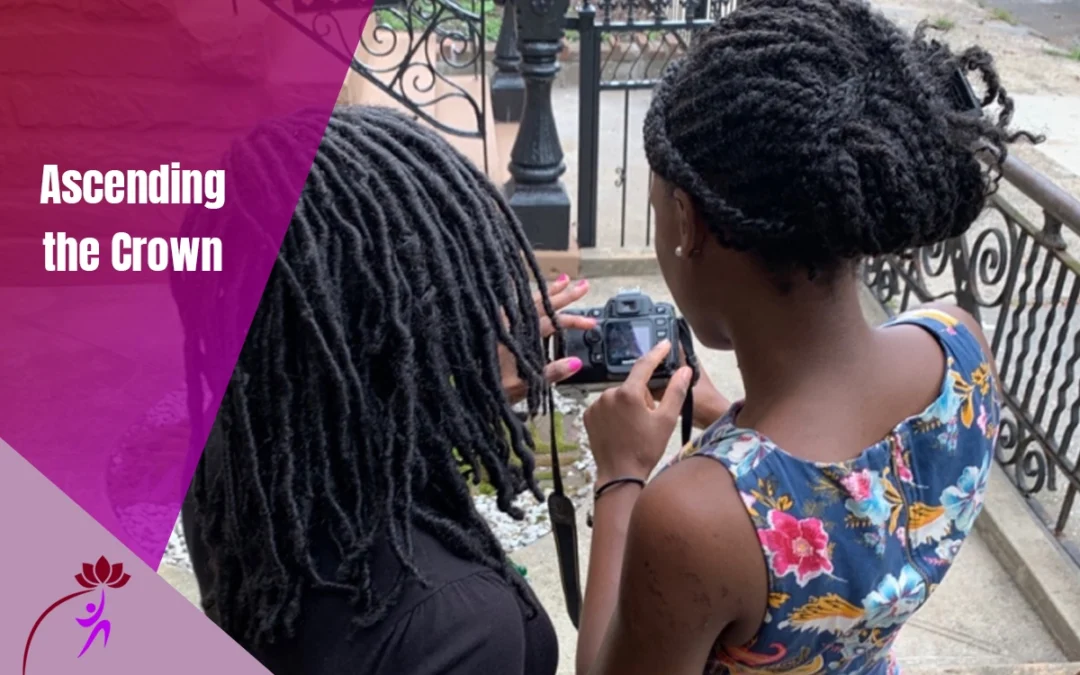“My hair doesn’t need to be fixed. Society’s view of beauty is what’s broken.”
-Essence for #NationalHairDay
The photograph above is one of several taken behind-the-scenes at the photo shoot for my website. The primary photographer was my niece Roberta who loves, among many things, engineering, mathematics, photography, building and designing, and architecture. By way of profession, she’s an architect and photographer. Roberta is the vision and artist behind many of the portrait photographs of me depicted on my website. Her laser focus, coupled with a discerning eye for geometry and precision, produced some stunning photos that inform my story, which I’m so delighted to finally share with you.
As Roberta and I huddled to review the early images and formalize plans for the “real” shoot, my daughter Terisha captured the photo. What great, intuitive sense to get behind us to tell the story. This perspective invites the viewer to eavesdrop and wonder. Our crowns seduce your attention. Roberta and I are both wearing what is known as “protective styles” for natural (“unrelaxed,” non-permed), textured hair such as cornbraids, twists, braids, and locs. Roberta is wearing a combination of cornbraids with twists casually pulled back into a bun and I’m wearing faux locs. Both of our styles were crafted by Roberta’s younger sister and my niece, Corinne the “hair slayer.”
For many of the women in my family, our natural hair is as organic as breathing and the color of our skin. It’s not at all about the pursuit of vanity or obsessive identification with our hair, but rather a mere detail of who we are. We view our natural hair as an extension of our physical being and consciousness as African descendants. It grows naturally from our scalp without any assistance from us and we choose to embrace the Universe’s design. It’s our birthright. It is also a marker of our cultural identity.
In many traditional African cultures, there was a widespread belief that the hair had spiritual significance since the crown is atop the head and is the highest part of the body closest to celestial bodies. In that sense, the crown was viewed as a sacred temple for accessing the spirit world and connecting to one’s God. Consequently, many elaborate styles were developed to symbolize status or heritage. The crown was almost always adorned! Pre-colonial Africans intuitively understood what the great prophet/reggae singer Bob Marley once proclaimed, “Trust the Universe and respect your hair.”
Alas, colonial legacies still abound in modern societies, especially here in the United States. Because of the continued discrimination that many Black people who wear natural hair experience in the workplace and in school settings, by virtue of wearing our natural hair, we are also inadvertently making a bold declaration of self-determination. Whether or not we intend to, we are challenging conventional notions of beauty premised on Eurocentric ideals and in essence, re-establishing links to pre-colonial African standards of beauty. Bob Marley’s powerful lyrics again call out to me, “Why can’t we be who we want to be? We want to be free.”
This was the subject of one of my Instagram posts this past summer where I talked about Roberta’s experience with hair discrimination during an interview with an architect firm here in New York City(!!). The white male interviewer asked my niece if she planned to change her hair—she wore it in cornbraids. My niece thanked the interviewer for the honesty of his question and declined to change her hair. This was an inconceivable notion completely misaligned with her self-concept. Two interviews later, she was hired by a leading international architect firm that valued her intellect and humanity. In the post of August 15, I reflected:
“When you know who you are and what matters to you, you tend to operate from core values. Doing so allows you to make principled decisions that honor your worth rather than conform to people’s limiting expectations of you. Know who you are—and own it!”
After a series of very public, humiliating incidents across the U.S. in which Black folks were discriminated against because of their natural hairstyles, in July 2019, California became the first state to protect citizens from discrimination based on hairstyle. Much credit is due to the NAACP for being a critical catalyst behind the law’s implementation. The law makes it difficult for employers and schools to single out and penalize individuals for wearing natural hair and styles associated with non-European standards of beauty. Essentially, the law primarily protects Black folks who choose to wear “protective styles” and defends their rights to be human beings! The law, SB188, is also appropriately known as The Crown Act: Creating a Respectful and Open Workplace for Natural Hair.
That such a law is needed in the United States of America in the 21st century is absolutely mind-boggling and another painful reminder that 150 years post-slavery Black folks have yet to achieve full and equal citizenship. And yet, though disturbing, it’s paradoxically tragic that California is the sole state to proclaim such a law. As history has shown us, it takes time for systems to adjust to the law and people’s view to change, which means discrimination will likely continue especially in other states where Black folks are not protected. It is often exhausting and debilitating to constantly fight just to be who we are, but falter we must not, for our very lives depend on our resistance. Conforming to bigotry of any kind is never an option.
Personally, I LOVE my hair exactly as it is as a visible expression of my identity as a Black woman who proudly embraces her cultural heritage. I love the woolly texture, the way it behaves—recoils when wet and twisted, and straightens when heat is applied—and the multitude of ways it can be artistically styled to express my mood or achieve a certain look—from knots to twists to braids to locs to huge puffy Afro. I have no intentions of making artificial adjustments or taming my hair so others may feel “comfortable” around me. I am a child of God and know my worth. I find it comforting to consider that if the Supreme Being wanted the human family to be a monolith, She would have designed us so! Thankfully, this is not the case and so I say, “Rock your Crowns with pride—and ascend to your God!” Or, “Trust the Universe and respect your hair.”
Postscript: Should you decide one day to shave your hair all off (or if nature does it for you!), remember that you are not your hair. You’ve never been your hair. The true essence of who you are lies deep within—you are divinity, beauty, strength, power, resilience, freedom, joy! Your hair merely allows you to express what’s within and to celebrate God’s fabulous design.
At Your Service,


About Glenda M. Francis
Glenda M. Francis is the founder of Audacious Inner Works Institute, a personal development and capacity building service organization. She is an ICF credentialed life coach specializing in confidence building and women’s wellness and power.
Contact:
Contact us for our life coaching and personal development services.

